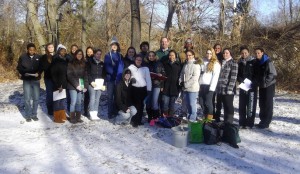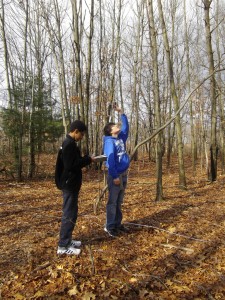We have a guest blogger this week! Mr. Kevin Dickson is a very active GLOBE teacher at West Haven High School in West Haven, Connecticut. He is also part of the NSF-funded From Learning to Research project with the GLOBE Program. We are glad Mr. Dickson could take some time out of his busy schedule to share his experiences!
The GLOBE program was created with one thing in mind, helping to track global climate change by taking advantage of the research that is being done in schools throughout the world. Students and teachers are monitoring water quality and biomass (and many other protocols) in classes such as Biology, Chemistry, and Environmental Science using technology that incorporates Math and Physics every day in their classes. This is sound, viable climate data for the area in which the school resides. Using data from schools around the world provides accurate data for climate analysis of the Earth. Teachers united under the GLOBE program are taking advantage of their student’s success, and in doing so,their schools are helping to save the world.
Making GLOBE part of any curriculum is easy. Chemistry, Biology, Environmental Science, Physics, Marine Science, you name it, it’s covered in the GLOBE program. By setting aside one day a month, your students can travel to your site for a few hours to collect data without ever disrupting your curriculum. Studying pH and salinity – set measuring pH and salinity a goal of your data collection. Studying photosynthesis – use the monitoring of biomass at different seasons and at day and night as opportunities to evaluate environmental impacts on photosynthesis. The opportunities are endless. GLOBE planned their program to address current school initiatives; all you have to do is take advantage of them. With the curriculum aligned, and the tools to perform the research in hand, the GLOBE program at West Haven was ready to begin.
I took those steps over a few months five years ago. In the past five years, the GLOBE program has evolved from students of all levels (I teach levels of alternative education students to levels of Honors and AP) going out a few times a year to measure water quality and canopy cover to add to the GLOBE database, to now performing research based projects throughout an entire year. The research projects that were performed by my students this year included monitoring the impact of acid rain on water quality, how invasive plants change a water shed, how the land cover of Cove River has changed through the ages based on archeological digs, and how influences of surrounding restaurants and businesses change the water quality due to pollution and eutrophication. When I started this project, five years ago, I had no clue it would develop into the success that it has become today.
Last year, I took a special GLOBE training where I met with teachers from all over the country to learn about and practice the GLOBE protocols and to discuss how to use the protocols in our classrooms. We left this program motivated and ready to transfer our excitement to our students. Within the first week of school, I knew I had a class full of ambitious students; all they needed was some motivation. I included in their Biology class a yearlong project based program where they had to decide what aspect of the Cove River site ecology they wanted to study (atmosphere, biosphere, geosphere, hydrosphere, anthrosphere) and then research it throughout the year. Today I collected their reports and poster projects. I immediately ran to my administration to share their success. My students had completed lab reports and poster presentations equivalent to those of a college level course. This success happened because I took advantage of the opportunities presented to me through my GLOBE trainings, and because my students took advantage of the opportunities I presented to them. The entire cost of my GLOBE project over the past five years has cost me less than $50.00. There isn’t a single student out there who isn’t ambitious to make a difference; all they need is a little motivation. Present them with the motivation that they need, and you to will be able to help them save the world, its that easy.
-Mr. Kevin Dickson
In our next part in the series, learn how Mr. Dickson became a GLOBE teacher and how he created the tools he needs to do the GLOBE Protocols with his students.
Do you have an amazing GLOBE teacher? Tell us why your teacher is awesome! Send an email to science@globe.gov or add a comment!



Thanks for this beautiful information. It’s worth reading. Love to see your blog!